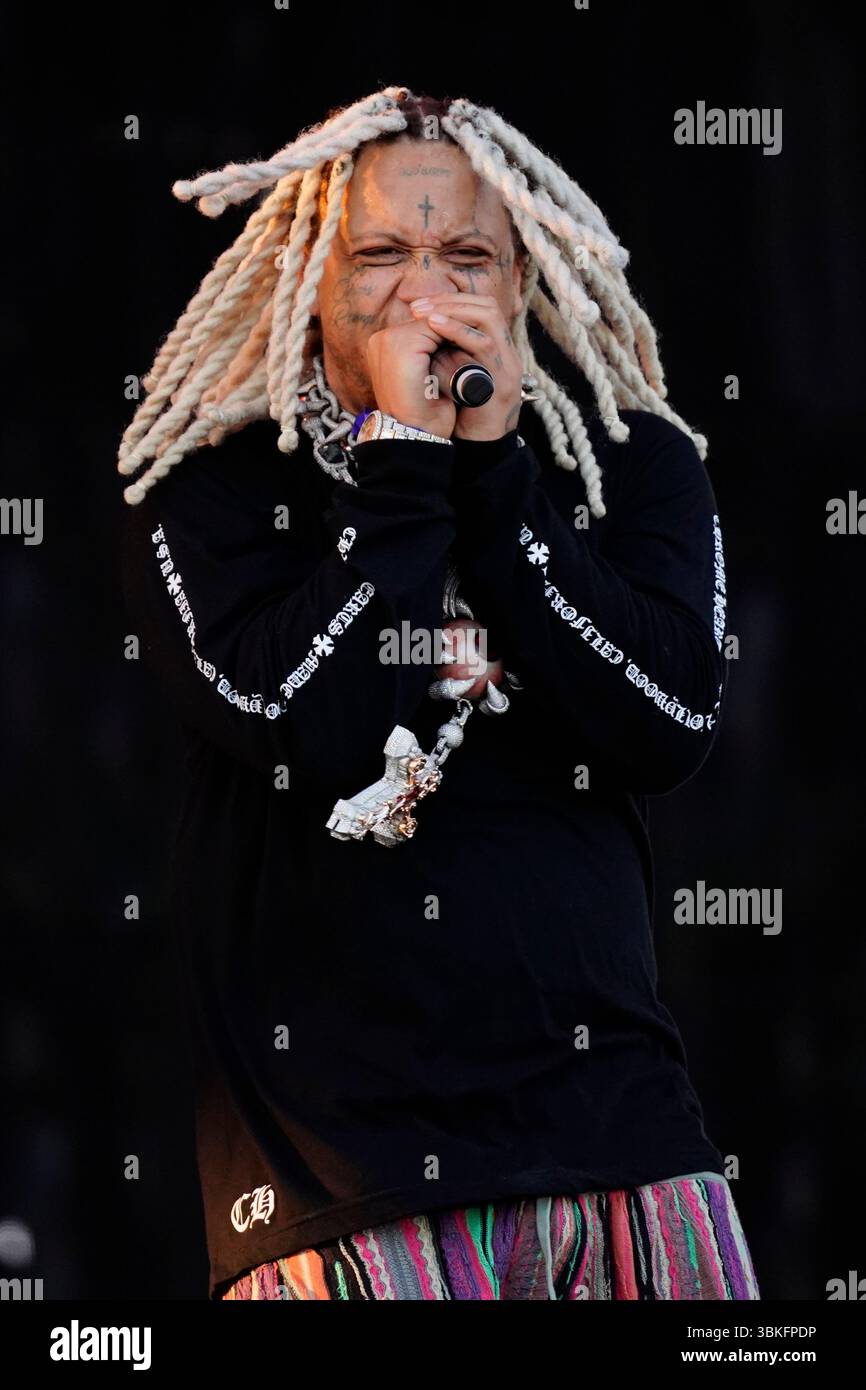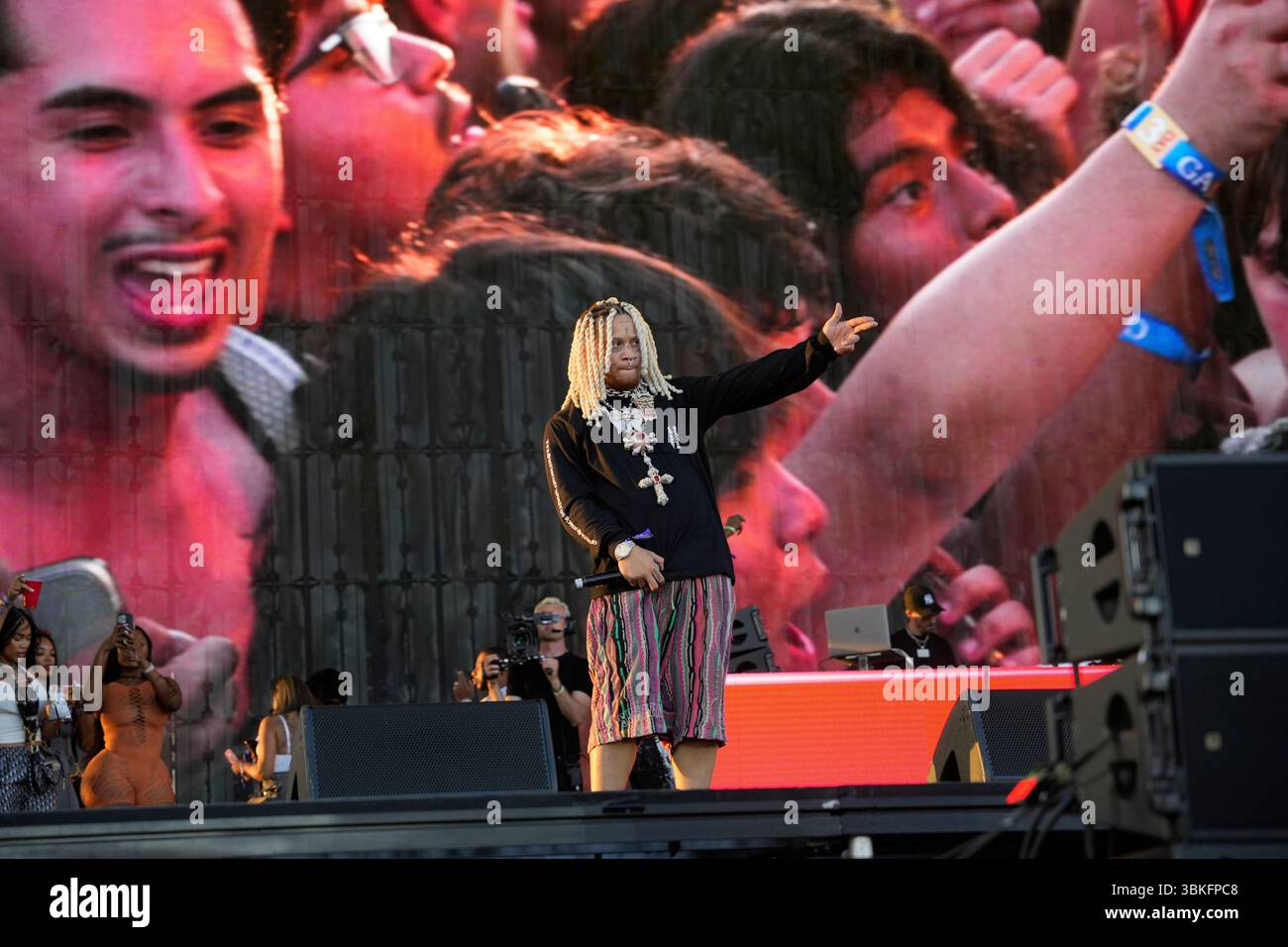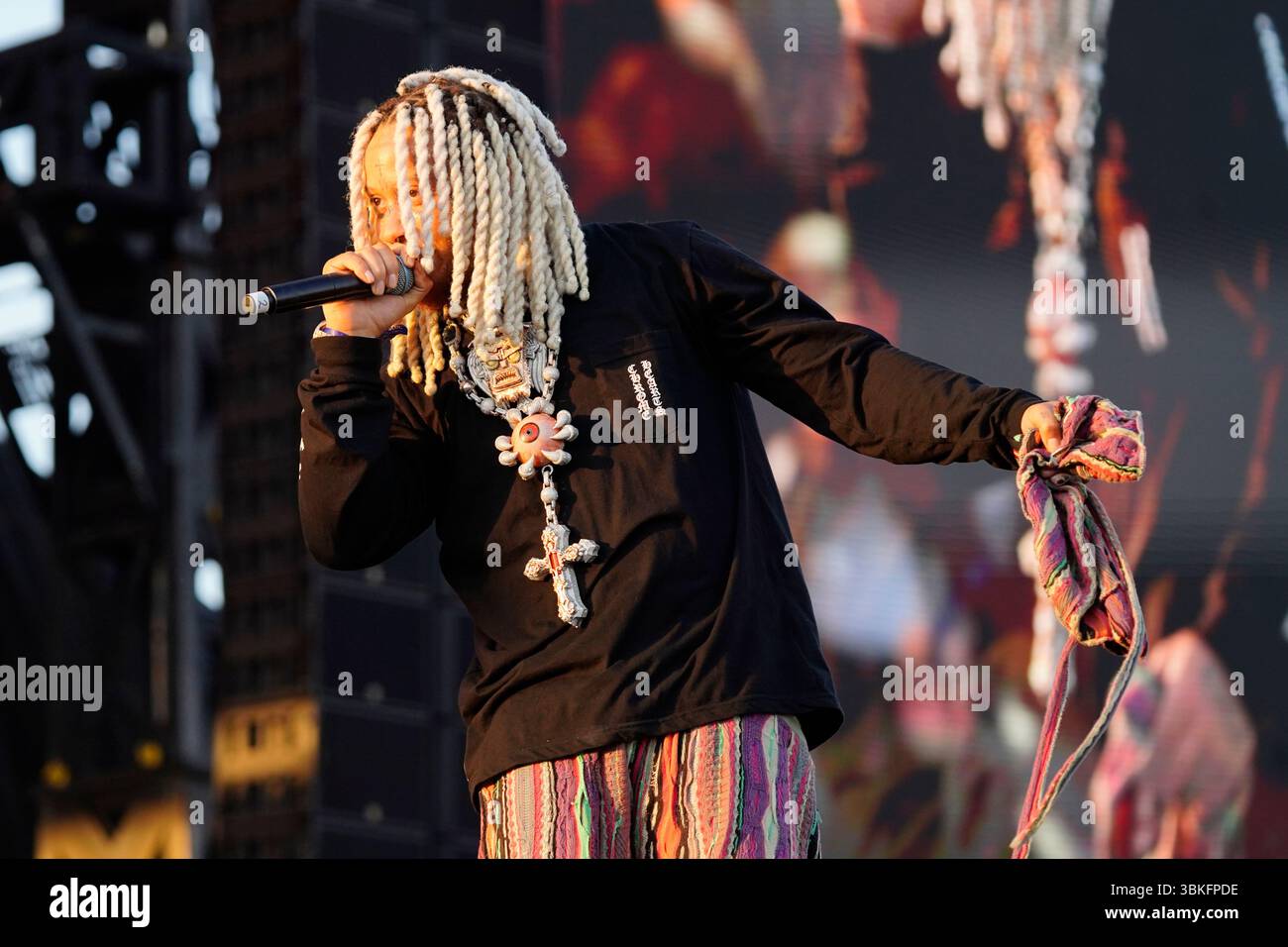There's a lot of conversation that goes on when someone brings up Trippie Redd, and it's interesting to see how people feel about his work. You know, for an artist who has gathered such a significant following, it's a bit of a wonder why some parts of the music world seem to have a strong disliking for him. It's almost like there are two very different groups out there, each with their own thoughts and feelings about the music he creates. This sort of divided opinion is actually quite common with artists who push boundaries, or who, perhaps, have been around for a while, allowing people to form very firm ideas about their sound.
When you look at online spaces, like the dedicated community for Trippie Redd, you find a good number of people, something like thirty-four thousand individuals, who gather to talk about everything connected to him. This space, you know, it's set up for people to share their thoughts and to discuss all sorts of things about his creative output. It’s a place where fans can come together, express what they enjoy, and even, at times, what they might not be feeling so much about his latest offerings. That, in itself, speaks volumes about the connection he has with a good chunk of his listeners.
Despite the strong following, there's also this recurring chatter, a sort of background noise, where people voice their disagreements with his artistic direction. It's not always clear why some people feel this way, but it's definitely a topic that pops up quite often. We'll explore some of the reasons people have put forward for these feelings, and try to understand the different perspectives that exist around this particular music maker. It's really about looking at the different sides of the story, as a matter of fact.
Table of Contents
- Who is Trippie Redd and What's His Story?
- Why Does Trippie Redd Get So Much Talk?
- Has Trippie Redd's Music Changed Over Time?
- How Big is the Trippie Redd Audience, Really?
- What's Next for Trippie Redd's Sound?
Who is Trippie Redd and What's His Story?
When we talk about Trippie Redd, we're really looking at an artist who has been making waves in the music scene for a good while now. His journey, you know, has been watched by many, and there are people who have followed his work since at least 2017. That was a time when he was putting out music, actually, alongside another artist, 69. This period seems to be a significant marker for many listeners, as it's often brought up when discussing how his sound has developed. It's almost like a reference point for understanding his early artistic expression.
His presence in the music world is quite notable, and it seems he has built a substantial career over these years. People who have been listening since those earlier days sometimes talk about how his music has evolved, or perhaps, changed its character. It's not uncommon for artists to shift their style, and with Trippie Redd, it appears some listeners feel a difference in his output, especially when considering his projects after something called "TAK." This suggests a clear turning point in his creative path, at least for some of his long-time followers, honestly.
While the provided information doesn't give us a full life story, it certainly paints a picture of an artist who has made a mark and generated a lot of discussion. The very fact that people are so passionate, both for and against his work, speaks volumes about his impact. It's a testament to the way his music connects, or perhaps, disconnects, with different listeners. This kind of engagement, you know, is something many artists would probably hope for, whether it's positive or negative feedback, in a way.
Personal Details - Trippie Redd
| Full Name | Information not provided in source text |
| Birthdate | Information not provided in source text |
| Origin | Information not provided in source text |
| Active Years | Since at least 2017 (as per source text) |
| Known For | Music, collaborations, distinct vocal style, sad music aesthetic (as per source text) |
Why Does Trippie Redd Get So Much Talk?
It's a question that pops up a lot: why do some people seem to have such strong negative opinions about Trippie Redd? A good portion of the rap music audience, it seems, just doesn't connect with him for various reasons. You see it quite often, actually, whenever his name comes up, there are many individuals who voice their displeasure. It's a topic that surfaces frequently in discussions about his work, and it makes you wonder about the underlying causes for such widespread feelings, you know.
One idea that's been put forward is that some of the talk might stem from his past association with 69. Some people wonder why he would get negative feedback for being involved with someone who was already not well-liked by many. It's a point that makes you think about how an artist's connections can affect public perception, even if the artist himself isn't the direct cause of the dislike. This particular situation, in some respects, seems to have left a lasting impression on some listeners.
Another thought, perhaps a more general one, is that the very nature of his music, particularly the "sad music" style, might be a factor. It's been suggested that people sometimes react negatively to artists who lean into that aesthetic, drawing comparisons to how some felt about artists like X and Juice. This suggests that it might not be about Trippie Redd personally, but rather a broader reaction to a certain type of emotional expression in music. It's a bit like how some genres just aren't for everyone, and this particular style might rub some people the wrong way, apparently.
Interestingly, there's also been a shift in this dynamic. Some people have pointed out that the amount of negative talk about Trippie Redd has actually lessened quite a bit lately. It used to be really, really bad, but it appears to have improved. Even the strong negative feelings from fans of another artist, Carti, seem to have gone away. This suggests that perceptions can change over time, and what was once a major point of contention might simply fade into the background as an artist continues to put out new material, or as the music landscape shifts, you know.
The Trippie Redd Community - A Place for Fans
For those who really enjoy his work, there's a thriving online space dedicated to Trippie Redd. This community, which has gathered a good number of members, is a spot where people can freely share and discuss everything that relates to him. It's a testament to the strong bond he has with his listeners, providing a common ground for shared enthusiasm. You see, it's a place where fans can truly connect over their appreciation for his unique sound and artistic vision, and stuff.
Within this community, you find creative ways people show their support and enjoyment. Someone, for example, even put together a "heardle" game using Trippie Redd's songs. It's a fun way for fans to test their knowledge of his tracks, and you can even share your score after playing. This kind of fan-made content really highlights the active and engaged nature of his audience. It's a very clear sign of how much his music means to those who truly follow him, obviously.
People in this space also put together playlists of their favorite Trippie Redd songs, sometimes even including tracks that haven't been officially released but can be found on video sharing sites. This shows a deep level of dedication, going beyond just what's available on typical streaming platforms. It's about seeking out every piece of his creative output, which really speaks to the strong connection fans feel to his artistic journey, as a matter of fact.
Has Trippie Redd's Music Changed Over Time?
A common sentiment among some long-time listeners is that Trippie Redd's music just doesn't quite have the same impact it once did. There's a feeling that his sound has, in a way, shifted, and not always for the better, according to some. This perspective often comes from those who have been following his career since around 2017, and they might point to his projects after "TAK" as a point where things started to feel different. It's a bit like how your favorite band might change their style, and while some embrace it, others long for the earlier sound, you know.
One specific observation that comes up is about the "love stuff" in his songs. Some listeners feel that these parts now sound less genuine than they used to. It's about the feeling, the emotional honesty, that they perceive has lessened over time. This suggests that for some, the connection to his music is deeply tied to its perceived sincerity. When that feeling changes, so too does their overall appreciation for the work, which is pretty understandable, honestly.
Another point of discussion revolves around his vocal delivery. People talk about how he used to stretch his voice in a way that sounded very raw and unpolished. That particular vocal characteristic was, for many, a defining part of his early appeal. When that changes, or when it's not present in the same way, it can alter the listening experience significantly for those who appreciated that specific element of his artistry. It's a very particular detail that seems to resonate strongly with his early audience, basically.
Listening to Trippie Redd - From Old Tracks to New Creations
For those who follow Trippie Redd's musical path, there's a clear distinction between his earlier work and his more recent projects. The shift in sound, as some perceive it, leads to different listening experiences. Fans who appreciate his past style might gravitate towards older releases, seeking out that particular feeling or vocal quality they remember. It's about revisiting those sounds that first drew them in, you know, and really enjoying that original vibe.
On the other hand, there are also listeners who might enjoy his newer material, or perhaps, they're just getting into his music now. For them, the recent projects are their introduction to his artistry, and they might not have the same frame of reference as long-time followers. This creates a really interesting dynamic within his overall audience, where different groups appreciate different phases of his career, which is kind of cool, in a way.
The existence of fan-made compilations, like playlists with unreleased Trippie Redd songs found on video platforms, shows a desire to explore every facet of his creative output. This suggests that even if some feel his official releases have changed, there's still a strong interest in his broader body of work, including those tracks that might not be as widely available. It's a dedication to finding all the pieces of his musical puzzle, which, you know, is a pretty common thing for devoted fans to do.
How Big is the Trippie Redd Audience, Really?
When you look at the numbers, it's clear that Trippie Redd has a truly massive following. He has accumulated nearly nine billion streams as the main artist on a popular music application, not even counting any songs where he's just a guest or single releases. That number alone is quite staggering, and it puts him in a very select group of artists. To be precise, he's currently ranked as the twenty-ninth most streamed rapper of all time on that particular platform, which is a significant achievement, honestly.
These figures really show the immense reach his music has. It's not just a small group of devoted listeners; it's a huge global audience tuning into his tracks again and again. This level of engagement speaks to the widespread appeal of his sound, regardless of what individual opinions might be about his recent work. It's pretty much an undeniable fact that his music resonates with millions upon millions of people, you know.
Beyond the streaming numbers, the existence of dedicated online communities, like the one with thirty-four thousand members, further illustrates the depth of his fan base. These are places where people actively choose to spend their time discussing his music, sharing their thoughts, and even creating fan content. This kind of active participation goes beyond just passive listening and shows a strong, committed group of supporters, in a way.
The Trippie Redd Fan Experience - Connecting Through Music
The ways people connect with Trippie Redd's music are quite varied and show a deep level of engagement. From playing fan-made games that test your knowledge of his songs to creating personal playlists that include unreleased tracks, the community finds unique ways to interact with his artistry. This isn't just about listening; it's about participating and making his music a part of their own experiences, which is pretty cool.
There are even interesting, perhaps playful, comments from fans that show the diverse ways people perceive him. Someone, for example, once referred to Trippie Redd as their "favorite 1930s music artist" in a discussion related to a popular video game. This kind of comment, you know, highlights the quirky and sometimes unexpected ways fans express their appreciation, showing that his appeal can transcend typical genre boundaries or even time periods in a lighthearted manner, as a matter of fact.
The constant discussion, whether it's praise or critique, indicates that Trippie Redd's work sparks strong reactions. This kind of lively conversation is often a sign of an artist who truly matters to their audience, prompting them to think, discuss, and share their feelings. It's this continuous dialogue that keeps an artist relevant and ensures their place in the ongoing conversation about music, you know, and that's something very few artists manage to achieve.
What's Next for Trippie Redd's Sound?
The music world is always moving forward, and artists often find new ways to shape their sound. The mention of sample packs, like a "Retro Rage Hyperpop Turbo 2043" collection that includes elements inspired by artists such as Trippie Redd, Pierre Bourne, Playboi Carti, and Ken Carson, suggests a constant evolution in music production. These packs, which contain sounds, drums, and one-shots, are tools that producers use to create new tracks. This hints at the ongoing influence Trippie Redd has on the broader soundscape, and how his style continues to inspire others, even in the creation of future music, you know.
This kind of influence means that even as his own music changes, his impact resonates through the work of others. It's a cycle where artists inspire new sounds, and those new sounds in turn might influence future creative directions. So, while some listeners might feel his personal sound has shifted, his presence in the wider music production world remains quite strong. It's a very clear sign of his lasting mark on contemporary music, actually.
Ultimately, the story of Trippie Redd is one of a musician who consistently generates conversation, holds a significant place in the streaming world, and maintains a dedicated fan base. His journey, marked by shifts in sound and public perception, continues to be a point of interest for many. It's a truly dynamic path, full of different opinions and connections, and it just keeps going, as a matter of fact.


